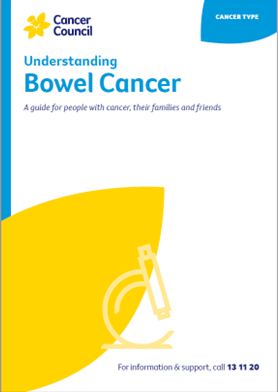- Home
- Bowel cancer
- Diagnosis
- Staging and prognosis
Staging and prognosis for bowel cancer
A range of tests can help show whether you have bowel cancer and whether it has spread from the original site to other parts of the body. This is known as staging and it helps your health care team advise you on the best treatment options.
Learn more about:
Staging bowel cancer
The most common staging system for bowel cancer is the TNM system, which stands for tumour–node–metastasis. The Australian Clinico-Pathological Staging (ACPS) system may also be used in some hospitals.
The TNM system gives numbers to:
- the size of the tumour (T1–4)
- whether or not lymph nodes are affected (N1–2)
- whether the cancer has spread or metastasised outside the bowel (M0–M1).
Based on the TNM numbers, the doctor then works out the cancer’s overall stage (see below for more detail). Around half of all bowel cancers in Australia are diagnosed at stage 1 or 2.
The stage can be predicted before surgery based on the results of your early tests, but may be revised after surgery, following tests on the cancer tissue and lymph nodes removed during surgery.
Stages of bowel cancer
| stage 1 | tumour is found only in the inner layers of the bowel wall |
| stage 2 | tumour has spread deeper into the layers of the bowel wall |
| stage 3 | tumour is in any layer of the bowel wall and has spread into nearby lymph nodes |
| stage 4 | tumour has spread beyond the bowel to other parts of the body, such as the liver or lungs, or to distant lymph nodes |
If you are finding it hard to understand staging, ask someone in your health care team to explain it in a way that makes sense to you.
Prognosis
Prognosis means the expected outcome of a disease. You may wish to discuss your prognosis and treatment options with your doctor, but it is not possible for anyone to predict the exact course of the disease.
Your doctor can give you an idea about the common issues that affect people with bowel cancer. Generally, the earlier that bowel cancer is diagnosed, the better the chances of successful treatment, but people with more advanced bowel cancer may still respond well to treatment.
Test results, the type of cancer, the rate and depth of tumour growth, the likelihood of response to treatment, and factors such as your age, level of fitness and medical history are important in assessing your prognosis.
→ READ MORE: Your health care team
Podcast: Tests and Cancer
Listen to more episodes of our podcast for people affected by cancer
More resources
A/Prof David A Clark, Senior Colorectal Surgeon, Royal Brisbane and Women’s Hospital, QLD, The University of Queensland and The University of Sydney; Yvette Adams, Consumer; Dr Cameron Bell, Gastroenterologist, Royal North Shore Hospital, NSW; Katie Benton, Advanced Dietitian Cancer Care, Sunshine Coast University Hospital and Queensland Health, QLD; John Clements, Consumer; Dr Fiona Day, Medical Oncologist, Calvary Mater Newcastle, NSW; Alana Fitzgibbon, Clinical Nurse Consultant, GastroIntestinal Cancers, Cancer Services, Royal Hobart Hospital, TAS; Prof Alexander Heriot, Consultant Colorectal Surgeon, Director Cancer Surgery, Peter MacCallum Cancer Centre, and Director, Lower GI Tumour Stream, Victorian Comprehensive Cancer Centre, VIC; Caitriona Nienaber, 13 11 20 Consultant, Cancer Council WA; Dr Kirsten van Gysen, Radiation Oncologist, Nepean Cancer Care Centre, NSW.
View the Cancer Council NSW editorial policy.
View all publications or call 13 11 20 for free printed copies.

